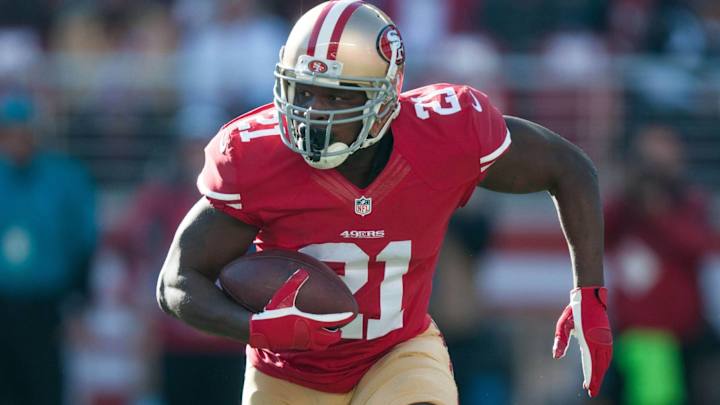We Will Never See Another Frank Gore

In this story:
In January 2012, in the days leading up to the NFC championship game, a reporter asked Frank Gore, then in the middle of his seventh season (and third Pro Bowl bid) whether he remembered the running backs who were taken before him in the 2005 NFL draft.
Gore said he could, then proceeded to robotically list the names one by one.
“First was Ronnie Brown, second was Cedric Benson, Cadillac Williams, then J.J. Arrington, then the boy who went to Carolina from Louisville, [Eric] Shelton, then me.”
Gore, who officially retired at age 39 on Thursday, was making a larger point about the metaphorical chip on his shoulder that kept his NFL longevity intact, knowing the list was already littered with players who had washed out of the NFL or would soon be on their way. But it was also an invitation into a psyche that carried him almost another decade past that moment, despite a heavy workload in one of the most violent and tenuous positions in football.
Gore cared deeply about the sport. He cared deeply about the fact that he worked harder than everyone else. He was more connected with the game than many of us are connected to the inner workings of our own lives. He was the running back version of Tom Brady without the marketing flare of a plant-based diet. Instead of pliability and healthy fats, it was a second workout at sundown each day at an old ball field near his house for the better part of 20 years. It was perfectly old-school, perhaps with no bearing on science save for the fact that he knew, in his own mind, that it separated him from other players regardless of age. That’s all that matters.
On the day he officially says goodbye—who knows, by the way, if he doesn’t reemerge from a boxing ring to take carries from his son, Frank Jr., in 2023?—Gore is decidedly less celebrated than some of the NFL’s defied ironmen. To this, we ask, why? While this is not a criticism of Brady, wouldn’t it be fair to assume that in the next 50 years of the NFL, given all of the advancements we’ve seen in medical science, player health and safety, and offensive game planning that we could see another quarterback perform artfully into his mid-40s?
We will never again see another Frank Gore. This alone should earn him a seat in the Pro Football Hall of Fame.
Gore was the kind of player who surprised people in his later years simply for his eagerness to endure, to continue. There’s a chance a team would have signed him now, simply for the baked-in value of having other players watch him work. Gore’s climb to 16,000 rushing yards (Gore is third all-time behind Barry Sanders and Walter Payton) was not beautiful after he left Jim Harbaugh and the 49ers. He latched on to the final years of Chuck Pagano in Indianapolis and the Dolphins, who went 7–9. Gore had his first winning season in 2019 after seven years in the league with the Bills. That’s almost three times the average lifespan of a running back in the NFL.
Gore did not have some prebaked roster tailor-made for his success that padded the hardest and most vulnerable years of his career. He took handoffs from Sam Darnold in road games trailing by 17 points in the fourth quarter, jamming his 5'9" body into some linebacker a year or two younger than Gore’s son. He had fewer goal line opportunities, which, having come of age in an era defined by fantasy football stardom, made him more of an afterthought to those who weren’t forcibly relegated to watching the waning moments of CBS’s fourth-ranked Sunday game at 1 p.m. It was unsexy football, but it proved Gore’s point. It’s a lot easier to wonder why Brady is still doing what he’s doing, with Mike Evans, Chris Godwin and Rob Gronkowski hauling in passes and a talented defense waiting on the sideline to close out games. It takes more mental gymnastics to wonder why someone would beg to join the 2020 Jets.
He loved a game that almost never loved him back, which is why he retires as one of the greatest players in NFL history. Not in college after he tore his ACL twice. Not in the draft after he was passed over 64 times. Not in the waning moments of his career, signing one contract after another for the veteran’s minimum and no promises beyond mop-up duty. It is safe to assume, given all we know about football now, given a player’s ability to walk into a broadcast booth and make enough money in one year to buy a small chain of Caribbean islands, that Gore was the last of his kind. That, alone, is worth remembering.
More NFL Coverage:

Conor Orr is a senior writer for Sports Illustrated, where he covers the NFL and cohosts the MMQB Podcast. Orr has been covering the NFL for more than a decade and is a member of the Pro Football Writers of America. His work has been published in The Best American Sports Writing book series and he previously worked for The Newark Star-Ledger and NFL Media. Orr is an avid runner and youth sports coach who lives in New Jersey with his wife, two children and a loving terrier named Ernie.
Follow ConorOrr